IPF webinar on "Role of Election Commission in Independent India"
Total Views |
IPF webinar on
"Role of Election Commission in Independent India"
21 January, 2022
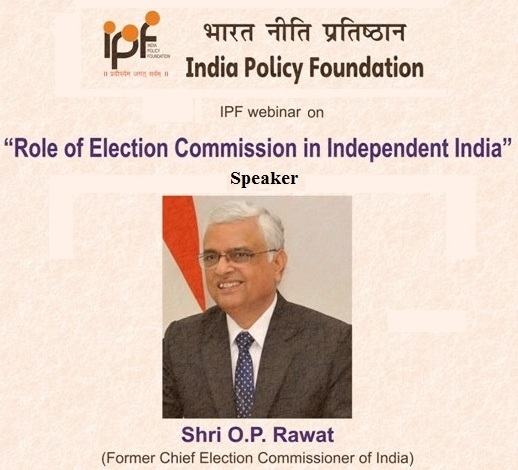
Keynote Speaker:
Shri O.P. Rawat
(Former Chief Election Commissioner of India)
Moderator:
Dr. Kuldeep Ratnoo
(Director, India Policy Foundation)
Dr Kuldeep Ratnoo:
Namaskar! I welcome everyone on behalf of India Policy Foundation. Topic for today’s webinar is: ‘Role of Election Commission in Independent India.’ I welcome our keynote speaker, Shri O.P. Rawat to the webinar. Before starting let me give his brief introduction:
Shri Om Prakash Rawat is a retired 1977 batch Indian Administrative Service (IAS) officer of the Madhya Pradesh cadre who served as 22nd Chief Election Commissioner of India. Before that, he had also served as an Election Commissioner of India. Hedid graduation and post-graduation in physics from the Banaras Hindu University (BHU), Varanasi. Apart from this, he also got another post graduate degree (MSc) in social development planning which he did in 1989 in the United Kingdom while being in service.
As an IAS officer, he served in various positions for both the Government of Madhya Pradesh and the Government of India, such as Principal Secretary to the Chief Minister of Madhya Pradesh, Principal Secretary (Commerce and Industries, Woman and Child Development,Tribal Welfare), Vice Chairman of Narmada Valley Development Authority, Excise Commissioner of Madhya Pradesh. As the Principal Secretary, Tribal Development in Government of Madhya Pradesh, he received the Prime Minister’s Award for outstanding and innovative work in the implementation of the Forest Rights Act, 2006.
Later, at the Centre, he first served in the ministry of defence and then he was appointed as the Union Public Enterprise Secretary in March 2012. He retired from service on 31stDecember 2013.But after some time, he was appointed as one of the two Election Commissioners of India in August 2015.
After the retirement of Shri Achal Kumar Joti, Shri Rawat took charge as the Chief Election Commissioner (CEC) of India on 23 January 2018. He retired from the post in December 2018. During his tenure at the Election Commission of India, elections to state legislative assemblies of Bihar, Tamil Nadu, Kerala, West Bengal, Puducherry, Assam, Uttarakhand, Punjab, Manipur, Uttar Pradesh, Goa, Gujarat and Himachal Pradesh were held. Besides, presidential as well as vice-presidential elections were also held during his stint with the Election Commission of India.
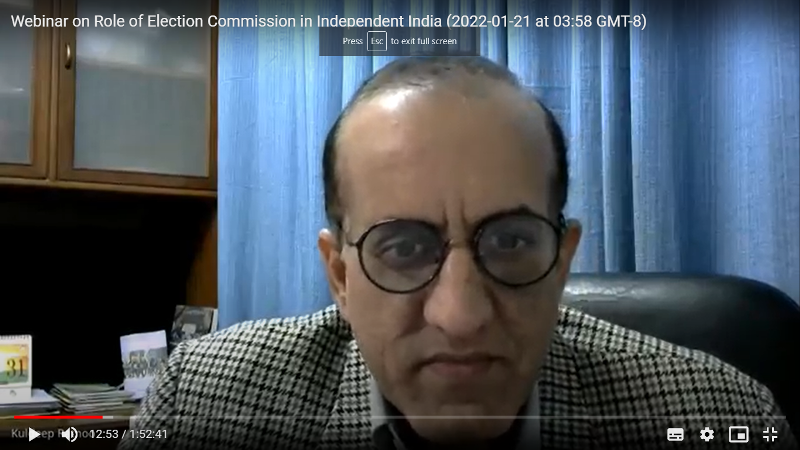
As India is celebrating its 75 years of independence, it needs to be noted that the Election Commission has contributed significantly to nation building. I request Shri Rawat ji to throw light on the role played by the Election Commission all these years, his experiences as the chief election commissioner and also to talk about the steps being taken to increase use of technology. Considering our vast population, and widespread illiteracy and poverty for decades, conducting frequent and fair elections in India is a huge task. The world has always been in awe of the scale of elections that are being conducted in India. I request Rawat ji to enlighten us about the achievements, challenges and vision of the Election Commission of India.
Shri O P Rawat:
Thank you Kuldeep ji. I thank everyone for joining today’s discussion.
Two people have commented on the role of Election Commission in independent India. One is, Mr Ramchandra Guha, who in 2017 said that a milestone that independent India can be proud of is its free and fair elections. The second is former president Shri Pranab Mukherjee who on 2017 Voter’s Day, in the presence of many international agencies and officials, said that free and fair elections have been made possible due to dedicated and upright civil servants of the country. Such officers have always ensured that the rules and regulations of elections are followed by all politicians and in cases of violation, the politicians have been held to account. To a large extent, this summarises the role that Election Commission has played in the conduct of elections in the country.
The first election was held in 1951-52 and the Election Commission of India (ECI) was formed on 25 January 1950. The Constitution of India was adopted on 26 January 1950. Till it came into force, elections were held according to the provisions of the Government of India Act 1935 which meant that only four crore voters were eligible to cast their votes. There was no universal voting right at that time. There were numerous conditions that one had to meet to qualify as a voter which included being a tax payer, owning property etc. After the adoption of the Constitution, it was estimated that there would be around 20 crore voters. There were no proper records to estimate the number of people who had crossed over from Pakistan and were in refugee camps. The literacy level was at a mere 13 per cent. Shri Sukumar Sen who was the Election Commissioner at that time took the pain and compiled the voter list. In 1952, the first elections were held successfully. Before leaving, the British had warned that the country would be ruined because of universal adult voting right.But with the successful completion of elections, they were proved wrong.
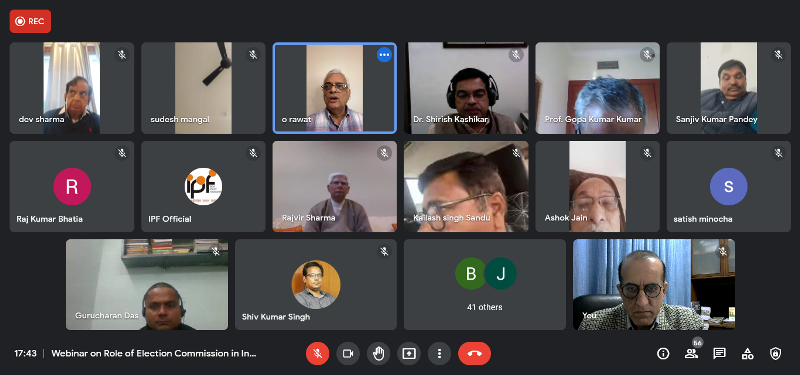
Due to rampant illiteracy at that point, instead of ballot paper, ballot boxes for each candidate were kept at every polling station. The voters were given a slip and they were required to put that slip in the box of the candidate they wanted to vote for. This was the manner which was followed in both 1952 and 1957 elections. After 1957, people had reached a position where they could read or identify symbols, so ballot paper was introduced. In the first election, manufacturing of ballot boxes was a big concern. Godrej Company was approached for making secure ballot boxes and they did their job efficiently.
Till 1967, the elections for parliament and state assemblies were held simultaneously. But after that, some state assemblies got dissolved before completing their tenure and elections started happening at different time periods. From then on, we have a situation where elections keep happening throughout the five-year period. Though ECI has proposed the idea of one nation, one election, there are still a number of formalities that need to be completed for this to happen.
In the following years, it came to ECI’s notice that due to differences within the political parties a lot of confusion was arising regarding claim over symbols. So, it came out with the Allocation of Symbols Order in 1968. It was a historic order whereby the ECI laid down conditions for the allocation of symbols to each party.
In 1977, there was a ruling by the Supreme Court which elevated the status of ECI. This was in the case M.S. Gill vs. Chief Election Commissioner. In it, the apex court ruled that if a challenge came before the Election Commissioner which did not have any remedy mentioned in the rulebook, then in such cases, the decision of the Chief Election Commissioner will be final and will have legal validity. To this day, the Election Commission has been using this power to resolve the toughest of issues.
After that, it was observed that numerous challenges had arisen in the electoral process. So ECI approached various agencies for the use of electronic voting machine (EVM). When EVMs were ready, ECI used it first in elections that were held in Kerala. But this decision of ECI was annulled by the Supreme Court stating that the ECI did not have powers to override the existing rules and regulations. This is the only judgement which went against ECI. But by the 1998 Lok Sabha elections, the use of EVM got the requisite legal sanction and by 2001 elections, it came to be in use everywhere.
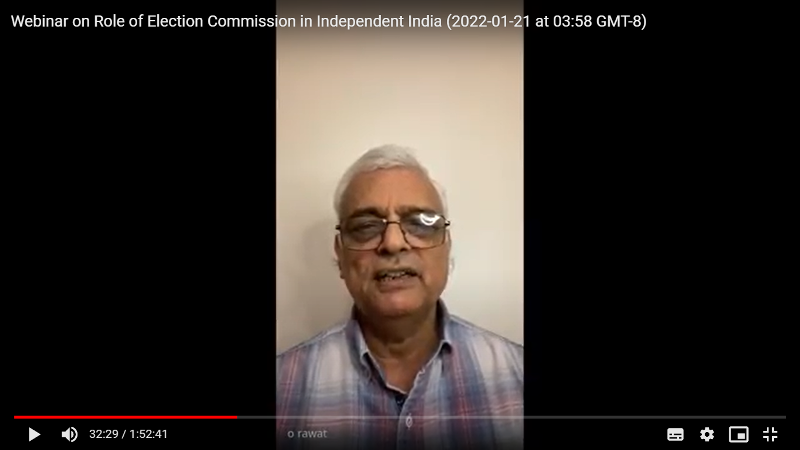
In the midst of this, there was a watershed moment in the history of ECI. This happened due to the far-reaching reforms unleashed by Shri T N Sheshan as CEC. He made the provision for appointing observers, for making voter ID cards, brought about financial ceiling on election expenditure etc. He had brought about such sweeping reforms that the then government decided that ECI should be a multi-member body and there will be two election commissioners in addition to the chief election commissioner. So, in 1993, two other election commissioners were appointed. After that, a law was also passed which stated that majority vote shall prevail in all decisions taken by the ECI.
When the EVMs were first used in elections, it was hassle free. But later, some people began to claim that it could be manipulated or hacked and after 2009 LS elections, this became a heated topic of debate. The ECI then took measures to address all the concerns. But in 2013, the Supreme Court observed that the voters were unaware of where their votewas going and directed the ECI to resolve this issue. So, voter verifiable paper audit trail (VVPAT) was formulated and was run on a pilot basis in a few booths. By 2017, this was instituted in all booths across the country. It helps voters verify their votes.
T N Sheshan also addressed the issue of candidates discriminating against areas from where they did not get expected number of votes by making provision for mixing the ballot papers before counting. Later, the ECI bought a totalizer machine to carry out this process for EVMs. The ECI has always ensured that all such reforms are carried out only after bringing on board all the stakeholders involved. With regard to the totalizer machine, there has been no consensus so far amongst the political parties because of which it has not been used in elections.
Another factor that I would like to draw attention to is the code of conduct. Based on the Kerala Model, the political parties suggested the enforcement of a code of conduct and promised to abide by it. So, with the support of all parties, ECI issued guidelines for the model code of conduct and to this date, it is being followed in all elections. In cases of violation, the decision-making power vests with the ECI. Provisions have been made in the Constitution which state that no court has the power to intervene in the decisions of the ECI when the elections are going on.
Another major issue was of candidates and their supporters’ grievances during polls. It was observed that almost 99 per cent grievances made to the ECI during elections were found to be false and were often based on rumours that political party workers had heard from somewhere. However, to address these grievances, the ECI had to spend a huge amount of time and resources. So, in 2018, the ECI decided that if democracy has to be strengthened, it was very important to empower the citizens. So, an app called cVIGIL was launched which enabled the citizens to instantly report any malpractice they observe by either giving details of the incident or by uploading videos of the incident. These will then go to the concerned Returning Officer, Controlling Officer, Chief Electoral Officer and also to the office of the Chief Election Commissioner. The ECI has mandated that any such complaint received should be verified within the first 100 minutes and necessary action should be taken and the complainant should be informed of the same. In the 2018 elections, over three lakh grievances were received through this app and almost 99 per cent of them turned out to be true. This has also saved the time and resources of the ECI. This step taken to empower the citizens was a revolutionary move and had contributed to the strengthening of democracy.
In 2017, it was observed that the only 2-3 per cent of our service voters, i.e., those who serve at the borders, would take part in voting through postal ballots. Their votes were seldom counted and their participation was almost equivalent to nil in the electoral process. Time was the main culprit here. The postal ballot used to take at least 15-20 days to reach them and a similar time period was taken for the votes to return to the ECI which meant that it used to reach only after the counting was over. In order to resolve this time lag, the ECI approached C-DAC to create a secure system to deliver the postal ballot online to service voters so that it reaches them early and there is enough time to get their votes and return these postal ballots through usual method. The e-postal ballot was inaugurated in the 2017 elections and you would be surprised to know that the participation of service voters in the Himachal and Gujrat elections rose to 65-67 per cent. Now the ECI has given a project to make the postal ballot’s return journey into electronic and work is progressing in this regard. This would also take us a step closer to remote voting.
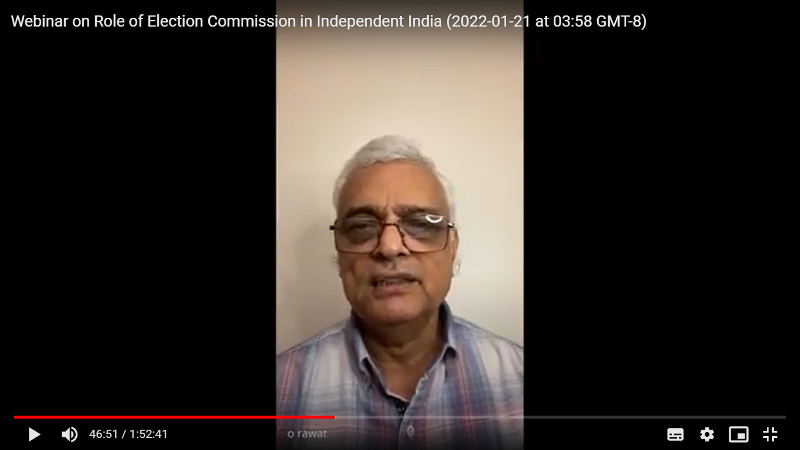
From the point of view of technology, the ECI is constantly trying to plug all loopholes to ensure free and fair elections. When it comes to EVMs, the first step is randomisation after which nobody knows which machine will go to which state. After that, the next step of randomisation takes place before sending EVMs to districts. Then another step of randomisation takes place before sending the EVMs to different constituencies and there is final step of randomisation before sending the machines to the polling booths. Due to these multiple steps of randomisation, there are no chances of rigging. But due to the questions that were raised in the 2017 elections, on 2 June 2017 when elections were due for states like Uttar Pradesh, Punjab and Uttarakhand, the ECI put forth a challenge to bring the EVMs from any state before it and prove that hacking is possible. The commission said that if anyone can demonstrate that it is possible to change even a single vote, it will accept that EVMs are not safe. No party took part in this challenge and in fact, representatives from two political parties approached the commission to enhance their knowledge about secured functioning of EVMs. This should have put this issue to rest but it still keeps cropping up during every election.
One final point I want to make is that there is an ongoing effort to grade elections across the world.Two universities, the Harvard University and the University of Sydney are working on an academic research project named, Electoral Integrity Project. Through this project, you will get comparative data about your elections and will get an idea of where your country stands. You will find that the Nordic countries are at the top of this list. Out of the 11 indicators, India ranksamong the top in nine indicators with scores ranging between 75-80 per cent. But in two indicators, we are at a really low level with just 33-34 per cent. Those two areas where a lot of work is left to be done are campaign finance transparency and media issues like fake news. Because of these two factors, India is at the 59th rank which is at the level of moderate electoral integrity. ECI has been working hard to address these two issues and I am sure that India will soon see progress on these fronts.
A new program called systematic voter education and electoral participation (SVEEP) was started in 2010. ECI felt that in order to increase voter participation, it was necessary to create awareness. The positive effects of this were seen in the 2014 elections itselfwhich recorded the highest electoral participation till then and the participation of women voters also increased by ten percentage points. So, with this programme, the problem of lack of electoral participation is getting resolved to a large extent with many states recording polling percentage of 85-90 per cent.
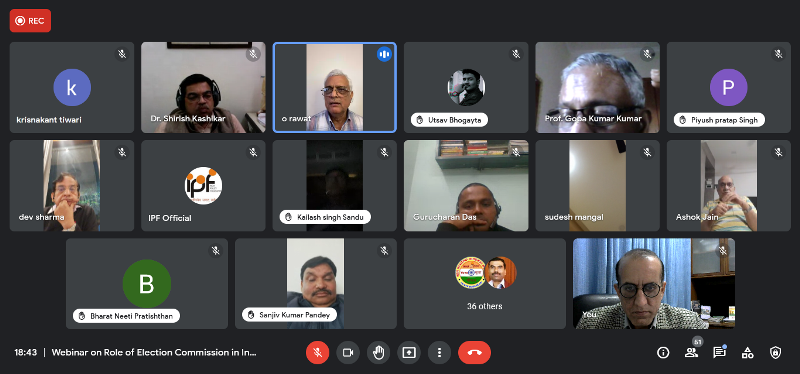
To conclude I would like to say that what we have achieved since independence is laudable. But in a process like this where our political class is very innovative and they are constantly finding ways to win elections, the ECI will have to stay vigilant and take measures to meet those challenges. I am reminded of the words of a US presidential candidate who said that India’s elections are gold standard to the world democracies. We need to treat these words as written in stone and should act accordingly.
Dr Kuldeep Ratnoo:
Thank you very much Rawat ji for presenting such a comprehensive record of election commission’s role in India. Now we can proceed to the question-and-answer session.
Q&A Session:
Ashok Jain: The use of EVMs has definitely put an end to strong arm tactics but how do you control the widespread use money power? Second question is that ECI issues notices on complaints but does it have enough powers to address the grievances that come before it?
O.P. Rawat: The ECI is vested with adequate powers to address the grievances. It is only due to misrepresentation of ECI in the media that people are having doubts. This may be because media is corporatized and they have to work according to their business interests. People do not often get an objective view.
About the use of money power, what you said is absolutely right. But I would like to point out that when the ECI got to know that about Rs 90 crore was distributed in a particular election, it cancelled the election on the basis of the 1977 Supreme Court ruling, because this money distribution completely changed the atmosphere. Later, the Supreme Court also upheld this decision. When elections were announced after six months, no incident of distributing cash or freebies came to the notice of the ECI. But later, it was learnt that a candidate had distributed tokens with the promise that it would be converted to cash after the results were announced, because then it would be outside the powers of the ECI to take any action. So, the political class keeps coming up with such innovative ideas and we have to work a lot harder to identify and plug these loopholes.
Prof Rajvir Sharma: The ECI had a huge role to play in strengthening India’s democracy. But it is also a fact there are many challenges before the commission. These challenges are both procedural and structural. A major issue that has been the topic of debate is “One Nation One Election.” National Law Commission and NITI Aayog have already submitted their reports on this. There are two sides to this – desirability and feasibility. The second biggest issue is that of paid news. Even though the ECI has issued guidelines for media houses to stay away from paid news, the truth is that paid news as well as fake news keep doing a lot of damage. Is there any way to blacklist portals and websites that spread misinformation? The third question I want to ask is if the facility of e-ballot can be extended to anyone who wants to make use of it?
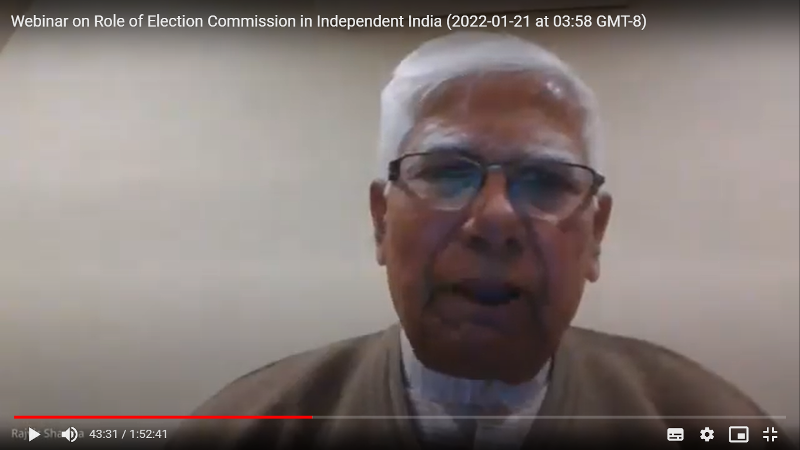
O.P. Rawat: The issue of “One Nation One Election” has been much debated and even the ECI has given its opinion to the government. It had suggested that if amendments are made to the Constitution and the Representation of People’s Act and also if logistics support is extended, then it is feasible. First four elections took place simultaneously – 1952, 1957, 1962, and 1967. It is both feasible and desirable. Some parties may think differently. If you look at the mandate of the 2019 elections, it is clear that people voted for different parties in state assembly and Lok Sabha, even if voting for both was on the same day. It is clear that voters are objective and they support only those parties that have worked for development. So, the concerns of political parties are unfounded. We need to realise that we will able to significantly reduce the use of resources with simultaneous elections.
Regarding paid news or fake news, ECI has worked extensively in this area. It had called the heads of all regional media and warned them thatif such materials are published on their platforms, they have to immediately withdraw it. All the media houses had given their consent for this. ECI had taken legal action against one media house and had also started legal proceedings against its proprietor. So, ECI has always been taking steps to curb fake news. But according to the views of the observers and also in our own eyes, this, along with campaign financing, are areas where we need to put in a lot more effort.
Prof Rajvir Sharma: Even now, a lot of politicians do not follow code of conduct. What do you have to say on this?
O.P. Rawat: Small violations of code of conduct do not lead to any major damage. But when the violations are major, ECI gets involved and deals with it using stringent measures. For first time violations, candidates are let off with a warning. Some people have put forth the suggestion that code of conduct should be made into an act. But ECI is against this as such a step will mean that matters will directly go to the court and there can be a major time lag in resolving the issue. It is not feasible when elections have to be completed within one or two months.
Vinod Johri: My question is with regard to opinion polls on which ECI has no control. Why is this so?
O.P. Rawat: It is permissible for opinion polls to be conducted before notification is issued. But if it is done after polling, then it comes under the category of exit polls. In such cases, the ECI immediately stops the broadcast of such events. Publishing such polls on any platform is a punishable offence. You can publish only after an hour after the last day of polling. In between, a lot of political parties and TV channels tried to circumvent this by making astrologers predict the result. But even then, the ECI came down heavily and initiated proceedings against them. People are innovative but ECI also stays alert all the time.
Pradeep Yadav: I work with the Delhi government and have served as presiding officer in four elections. I have observed that people from lower socio-economic strata or who are illiterate do not have much knowledge about role and powers of ECI. Why is this so and what can be done to increase awareness?
O.P. Rawat: ECI has also realised the importance of spreading awareness, especially in the rural areas. So, in the 2018 state assembly elections that were held in Madhya Pradesh, Rajasthan, Telangana and Chhattisgarh, mock polling was conducted with EVMs and VVPATs from village to village. The villagers managed the EVMs and also did counting. So, in two hours, the villagers were made aware of the process and it also helped dispel the myths surrounding EVMs. ECI is doing good work in this direction.
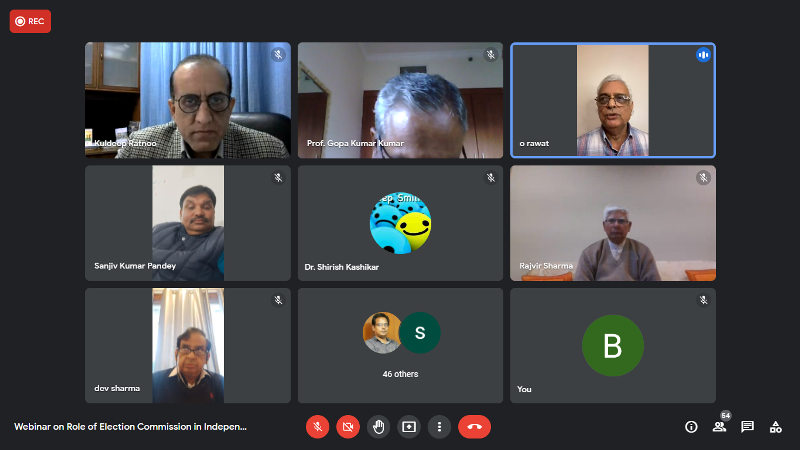
Jay Jani: Is it possible to think beyond EVMs and completely digitise the voting process?
O.P. Rawat: As and when the rural areas and forest pockets become connected with digital world, there will be efforts by the ECI to digitise the whole process. It can become a reality in the future.
Prof Archana Swashilya: My concern is about financial integrity itself as there is still free flow of funds.But citizens also have a responsibility. What do you expect from the citizens for curbing the use of money power? Why do they always go after freebies? I teach in a college in rural area where we have electoral literacy clubs to make students aware about elections. Is ECI taking any steps to increase citizen vigilance?
O.P. Rawat: The electoral literacy clubs that you mentioned is an initiative under SVEEP and it has been making a positive impact in rural areas. What you mentioned about freebies is part of the political domain and it is the prerogative of the political parties. ECI only has to see where the resources to fulfil those promises will come from and for this, a committee has been formed. Citizens are the best judge to determine whether these promises made at the time of elections have been fulfilled or not. As far as expenditure by political parties is concerned, there is a need to introduce ceiling on expenses by political parties. Right now, only the candidate’s expenditure is scrutinised. Political parties can spend even Rs 100 crore for campaigning. The only condition is that the candidate’s name should not feature anywhere in the campaign. Since there is a law already in place, ECI cannot get into this and it has to be decided by the Parliament.
Krishnakant Tiwari: During your tenure as Chief Election Commissioner, Bihar saw its most peaceful poll till date. How did you manage this? After T.N. Sheshan, I consider you amongst the most respected election commissioners.
O.P. Rawat: From Sukumar Sen to the present chief election commissioner, everyone has contributed equally to uphold the integrity of that office. No single person can be given credit for it as it is a team effort. Sincerity, dedication and objectivity have been the hallmarks of ECI.
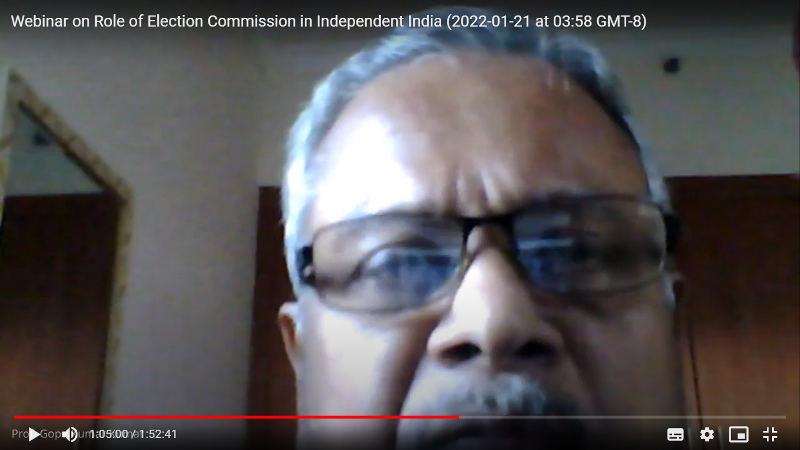
Prof Gopa Kumar: We are aware of the fact that the ECI has done tremendous work in improving the quality of our democracy. Is it possible for the ECI to organise a better civil society discourse in the country, because civil society is very important for our country and ECI has done good work in rural areas about electoral literacy?
O.P. Rawat: This is an excellent suggestion. In 2017, we had such a discourse for differently abled voters and how to increase their participation in elections. A number of civil society groups participated in the discussion and gave their suggestions. And many of their suggestions have been implemented in the last three years by the ECI. I will forwardyour suggestion to ECI that civil society discourse is taken care of duly.
Gopal Parihar: Can we make a law to disqualify those who level baseless allegations against EVMs?
O.P. Rawat: Uttarakhand High Court had issued an order stating that if anyone comes with baseless allegations against EVMs, it will be seen as a punishable offence. But it won’t be in the interest of democracy to issue a gag order or to supress dissent. What needs to be done is to spread awareness among citizens.
Priyadarshi Dutta: A law was recently passed in Parliament, Elections Laws (Amendment) Bill 2021, which has now permitted four qualifying dates in a year for registration of new voters. I remember it was suggested by S.P. Sen Verma, after fifth Lok Sabha election. But it took nearly 50 years to implement this reforms suggested by ECI. In 2016, the parliament brought out a booklet with 50 proposals for election reforms but only three have been implemented. Do you think Parliament should be a little bit more sensitive to the needs of ECI and implement reforms at a faster pace?
O.P. Rawat: Our Constitution has made Parliament sovereign and all powerful. So, we have the power only to put forth suggestions and cannot do anything beyond that. ECI has always been writing to the Law Ministry with its suggestions and some of those are implemented immediately. Like the service voter’s one-way electronic transmission was done in 11 days after giving the suggestion. Aadhar card’s linking with voter’s id, increasing qualifying dates to four, and replacingthe term wife with spouse so that husbands of female service voters can also take advantage of the postal ballot system. These three are welcome steps. Linking Aadhar card with voter’s id has eliminated a lot of bogus voters and within months of this decision, 30 crore voters came forward voluntarily to link the two. This means that voters want their identity to be verified and put an end to duplicate voting. We need to progress with patience and keep facilitating such reforms.
Gurucharan Das: There are reports that many illegal immigrants enrol in the voters list using fake documents in the case of Assam. How can ECI stop this? There are also cases of genuine voters being categorised as D-voter. How do you rectify this?
O.P. Rawat: This is an important issue of Assam. ECI enrols under the Representation of People Act 1950. Returning officer verifies all qualifying markers and only then they are enrolled as voters. The Doubtful voter or D-voter is in the case of foreigners’ tribunal which are set up for this particular issue in Assam. These are all remedial measures for a large-scale issue of illegal migrants in Assam. In the society that we live in, we find that such remedial measures are only partially successful. The citizens are also partly to blame for not using the remedial mechanisms in place. We must make people more aware of such measures. The ECI and the state government should put their minds together to resolve it as fast as they can.
Utsav Bhogyata: What is the impact of linking Aadhar with voter id on elections? Can you please address the privacy concerns surrounding it?
O.P. Rawat: The linking will help the ECI in two major ways, The first is identification using biometric data. It will enable those who are abroad, or the migrant workers to cast their votes and will also be an important step in enabling remote voting. The second is, the onus is still on the voter to issue a declaration whenever he/she is transferred to another place and to ensure that his/her name is on the list in the new place. But 95 per cent of voters do not issue this declaration because of which there comes duplication. Aadhar will help identify duplicate voters.
There is a fear that people will be robbed of voting rights if the two cards are linked. This is baseless as Aadhar is only for identification. About the issue of privacy, ECI has ensured that the data of voters can never be leaked. It will keep on updating its cyber-security measures to keep the data safe.
Sanjiv Kumar Pandey: Migrants in Bihar have to face a lot of hurdles to reach their hometowns during elections. Is India ready for online voting?
O.P. Rawat: We have 7-8 crore migrant workers in the country which is a huge number and it is important to ensure their participation. ECI has been working on this issue since 2015 and as soon as technology for the return journey is developed, ECI will implement it after taking into confidence all the political parties. ECI is also exploring technologies like blockchain. ECI is also working with ministries to find a way to give migrants their voting rights. We will see success in this regard soon.
Piysuh Pratap Singh: In this regard, I want to add that technology can help us authenticate users. We have already developed technology for this.
Gagan: How important is the five-year term for a government? Should it be increased to 10 or 15 years?
O.P. Rawat: This is outside the domain of ECI.
Karuna Shanker Ojha: Is our democracy mature enough to use NOTA or has it been reduced to a political tool to misguide voters in the rural areas?
O.P. Rawat: NOTA was brought under the direction of Supreme Court. When there was ballot system, there were ways for a voter to make a vote invalid, if he was forced by some candidates to cast his/her vote. It is not possible in EVMs as you have to press a button. So, NOTA saves voters from harassment. Later, people started thinking in the line of disqualifying all candidates if a constituency receives more than 50 per cent NOTA. This can be a thinking point for the future. SVEEP can be useful to spread awareness among people about NOTA.
Dhiren: There are number of candidates with criminal background contesting elections. Can ECI do something about this? And can we introduce educational qualifications and a term limit for a candidate?
O.P. Rawat: This again comes under political domain. ECI has no role in this. I personally feel, unless and until, the literacy rate of our nation reaches 95-99 per cent, it will not be possible to introduce such qualifications.
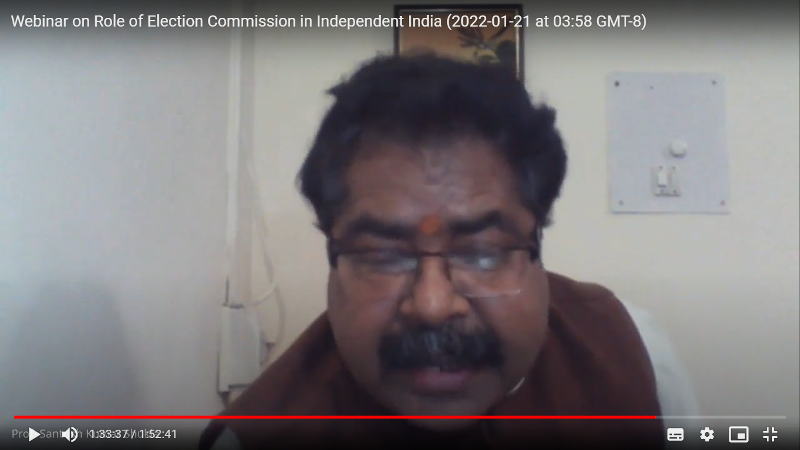
Prof Santosh Kumar Shukla: In our ancient text, Baudhayana Dharmasutra, the qualifications for becoming member of Vidhi Nirmatri Sabha, the law making assembly,are clearly mentioned. According to these, those who do not have any vrat (vow or resolve), those who do not have ideas and vision, and those who care for only one Jati (social group), can not think about larger national interest and so even if such people are in majority, they should not be made members of a Vidhi Nirmatri Sabha. Today, we see so many politicians and political parties, who openly claim to represent one Jatior group, are contesting elections. In our constitution, we have clearly mentioned that there won’t be any discrimination on the basis of birth, caste, religion, state etc, and elected members of parliament and assemblies will work to keep India united, yet many political parties and candidates claim to represent and work for a particular caste or group. How can we expect these parties to think about larger national interest and welfare of all? Why can’t ECI look at suchparties and candidates beforeallowing them to contest elections?
O.P. Rawat: In the Constitution, ECI has been given only three responsibilities. Article 324 states that there shall be an Election Commission for maintenance and updating of electoral roll and providing superintendence and direction and control for conduct of elections. ECI cannot go beyond this mandate. But your suggestion is enlightening.
Hemant Tak: Why it is far easier to register a political party than to register a company? Any one can register a political party for money matters.
O.P. Rawat: The registration process for political parties is indeed very easy and at one time the number of parties was in thousands. ECI had initiated process to deregister parties that did notcontested elections for 10 years, did not meet certain criteria. It is an on-going process and we will definitely see reforms. However, political party is not defined in constitution and law, and ECI did some work regarding this.
Prof Archana Swashilya: My question is related to electoral literacy club. Delhi government has come out with this initiative where first-time voters can register on a particular site and they will get their voter id cards. It has come to my notice that a lot of youngsters who are not from Delhi are getting their cards from Delhi. Do you see this as a problem?
O.P. Rawat: According to law, anyone who lives in a place for six months or more becomes a resident of that place and your voting rights are in that place. So, the students who are in Delhi for a course spanning 10-12 months are considered as residents of that place. If someone doesn’t want to enrol as a voter in Delhi, supporting documents can be submitted and he/she can get registered in the place of his/her choice.
United Women India: We have approximately 25 per cent seats reserved for SC/ST in Lok Sabha and in state assemblies. Then why is the ECI not releasing data stating the voting percentage of SC/ST? What happened to 33 per cent reservation for women? Why can’t we start with women reservation on these reserved seats? In some states like Bihar we see that candidates contest Panchayat elections independently but political parties get involved athigher levels. Then why does ECI allow parties to involve at Vidhan Parishad level?
O.P. Rawat: Caste wise voting percentage is never gathered but it can be done as it is marked in the voter list. ECI has no role in reservations but still ECI arranged a meeting of political parties and suggested that they ensure representation of women. Nowadays even municipal level elections are contested by parties. But for panchayat level, it is upto the Parliament to address this issue.
Lekshmi Parameswaran: Even with tightened security and enhanced use of technology, there are still many instances of election rigging. In a state like Kerala, where margins are wafer thin, we have seen the dominant party employ strong arm tactics in their strong pockets. Is it because of the respective state government’s non-cooperation that the Election Commission fails to function effectively in such states?
O.P. Rawat: Absolutely no. State governments have to cooperate with the ECI. If any election official does not follow the ECI’s guidelines, ECI can change that officer. There are arrangements to ensure strict compliance of the ECI’s guidelines during elections and that generally happens. If there are any loopholes in that area, those could be pointed out directly and ECI will be very happy to address those. Hardly any such incidents have come to the notice of ECI when I was there.
Q: Are you satisfied with your tenure as chief election commissioner?
O.P. Rawat: I am fully satisfied with my tenure and whatever I have achieved. I am really proud of my colleagues for their cooperation and for delivering what was desired of them.
Q: Instead of multi-phase elections, extending to several weeks, can we have elections within shorter duration?
O.P. Rawat: It depends on the availability of central paramilitary forces because most of the political parties feel that the state police are under the thumb of the ruling party. Therefore, everyone demands for the deputation of central paramilitary forces at all polling stations. That is the major constraint for having less duration polls.
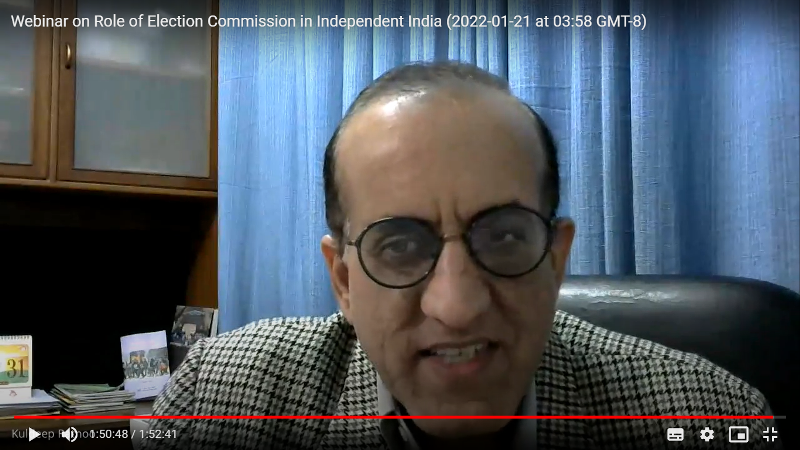
Dr Kuldeep Ratnoo: In recent times, we have seen that the influence of social media has increased immensely. Now due to Corona virus spread, there will be digital campaigns because election rallies cannot be organised and physical public outreach has limitations. Considering how other countries can influence the voters’ mindset through social media, what are the precautions that need to be taken to ensure that digital media do not influence the election outcome?
O.P. Rawat: This is a very serious concern, internationally to all democracies. There were allegations that one of the most developed democracy’s presidential election was affected by this. Big data firms, profiling of voters, targeted communication -all these are real concerns. ECI has started working to regulate and control all these issues since 2017. Lot of work has been done in this direction and there is a lot more that needs to be done.
Dr Kuldeep Ratnoo:
Thank you so much sir for the insightful discussion. Thank you for giving us so much time. I would also like to thank all the participants who listened with such patience. Thank you everyone!
***